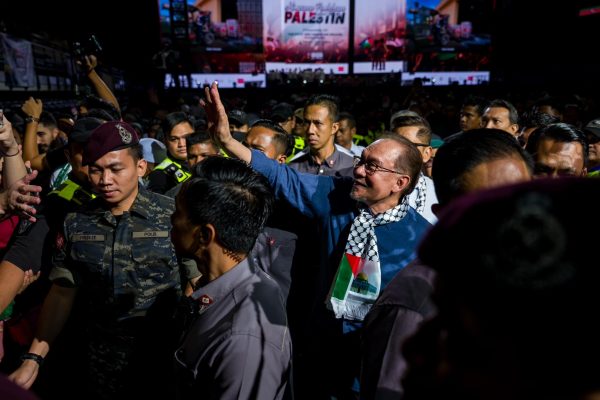The tech giant Meta yesterday apologized to Malaysia’s government for erroneously removing social media posts by Prime Minister Anwar Ibrahim, in which he expressed condolences to the Palestinian militant group Hamas for the assassination of the group’s political leader.
Ismail Haniyeh and his bodyguard were killed on July 31 in Iran, presumably by Israel. Later the same day, Anwar posted on Facebook and Instagram a video recording of his phone call with a Hamas official in which he offered his condolences for Haniyeh’s death. He also posted a picture of him embracing Haniyeh during their last meeting in Qatar in May, along with a condolence message stating his torch of struggle will keep burning and fueling our spirit.”
The posts were later deleted by Meta, which designates Hamas as a “dangerous organization” and bans content praising the group, in some cases using an automated algorithm.
After the posts were removed, Anwar posted a message on Facebook sending a “clear and unequivocal message to Meta: Cease this display of cowardice and stop acting as instruments of the oppressive Zionist Israeli regime!” His office then summoned Meta officials to explain the decision, issuing a statement, it said that it viewed Meta’s actions as “discriminatory, unjust, and a blatant suppression of free expression.” It described it as “an affront to the legitimate struggle of the Palestinian people in their pursuit of justice and human rights.”
Reuters quoted a Meta spokesperson as saying that the company was sorry for what they described as an “operational error” that had led to the removal of Anwar’s posts. They added that the content had been restored with “the correct newsworthy label.”
Both posts now bear a label stating that they have been “allowed for public awareness.” “In some cases,” a further dialogue box explains, “we allow content which would otherwise go against our Community Standards.”
Anwar and his government have been outspoken about the Israeli offensive on Gaza. The Malaysian leader has described the ruthless Israeli response as “the height of barbarism in this world,” and repeatedly called on Israel to end its occupation of Palestinian territories, including, most recently, at a “Palestine liberation rally” in Kuala Lumpur on the evening of August 4.
Anwar has also gone further than other pro-Palestine leaders in expressing his support for Hamas in particular. He spoke with Haniyeh by phone in October, followed by an in-person meeting with Haniyeh and other top Hamas leaders in Qatar.
Anwar’s pro-Palestinian and pro-Hamas positions have courted frictions with Western partners, including the United States. It has also created disagreements with Western tech giants. In October of last year, just three weeks after Hamas’ violent incursion into southern Israel, Malaysia’s communications regulator said that it would issue a warning to the social media firms TikTok and Meta for allegedly blocking pro-Palestinian content on their platforms.
This came after reports that major social media networks were blocking pro-Palestinian posts and accounts. Meta has denied that it is deliberately suppressing pro-Palestinian voices, though the line between support for Palestine and support for Hamas remains blurry.
In May, Meta also automatically deleted – and then restored – Anwar’s Facebook posts documenting his meeting with Haniyeh in Qatar. As of now, it said these were taken down in error.





















Discussion about this post